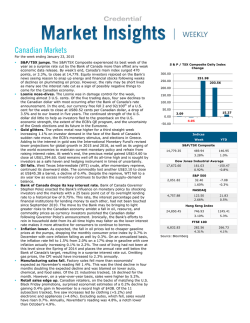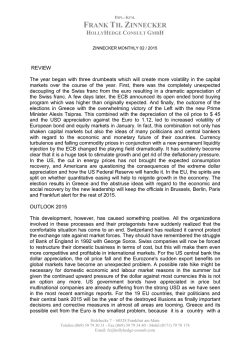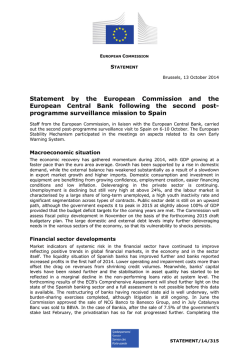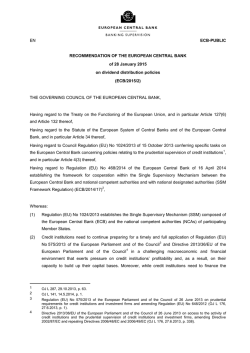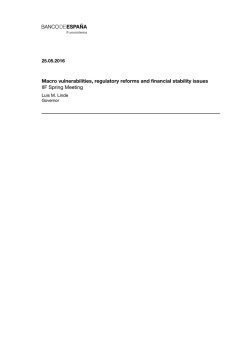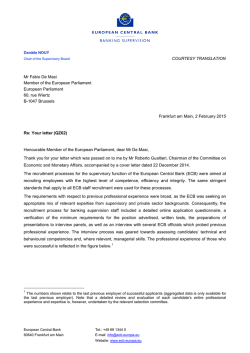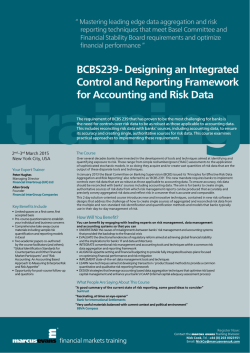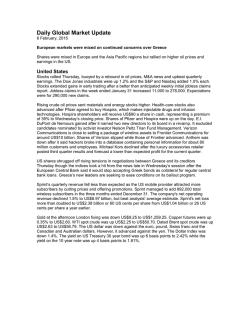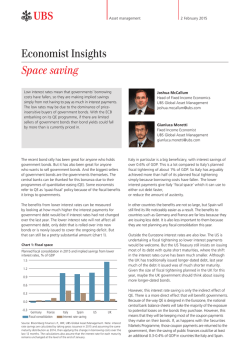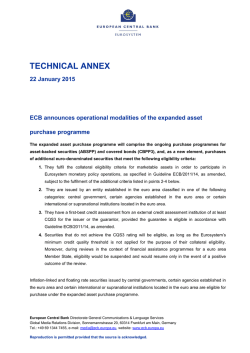
ECB Banking Supervision recommends prudent dividend policy and
29 January 2015 PRESS RELEASE ECB BANKING SUPERVISION RECOMMENDS PRUDENT DIVIDEND POLICY AND ANNOUNCES REVIEW OF VARIABLE REMUNERATION ● Banks should adopt a conservative policy when distributing dividends, taking into account the current challenging economic and financial conditions ● Banks with a residual capital shortfall following the comprehensive assessment in 2014 should not distribute dividends ● Banks must continue to build their capital base to meet 2019 capital requirements ● ECB Banking Supervision announces examination of banks’ variable remuneration ECB Banking Supervision has today issued a recommendation to banks on their dividend distribution policies for the financial year 2014 as part of its aim to strengthen the safety and soundness of the euro area banking system. The ECB has also notified banks that variable remuneration will be thoroughly reviewed in the coming months. The dividend recommendations follow on from the comprehensive assessment, the recent indepth review of the largest banks’ balance sheets aimed at boosting public confidence in the banking sector. They come in the context of a challenging macroeconomic and financial environment that puts pressure on banks’ profitability and their capacity to build up capital. Danièle Nouy, Chair of the ECB’s Supervisory Board, said: “Banks should base their dividend policies on conservative and prudent assumptions, so that after any pay-out they can still fully cover their current capital requirements and prepare themselves to meet more demanding capital standards.” The ECB has written directly to the significant banks to give specific recommendations for the payment of dividends in 2015 for the financial year 2014. The ECB has also requested the national supervisors to implement the recommendations for the less significant banks, which they supervise directly. Banks are already required to maintain certain capital levels under the Capital Requirements Regulation and Directive (CRD IV). At the same time, they need to continue preparing for a timely and full application of CRD IV (following any transitional provisions) by 1 January 2019. The ECB has therefore adopted a risk-based approach by distinguishing between three categories of banks. 2 ● Banks that already fulfil their capital requirements as of 31 December 2014 and have already reached their “fully loaded” capital ratios (January 2019 requirements) should distribute dividends conservatively so as to continue fulfilling all requirements even if economic and financial conditions deteriorate. ● Banks that already fulfil their capital requirements as of 31 December 2014 but do not yet have fully loaded capital ratios (January 2019 requirements) should likewise distribute dividends conservatively, but only to the extent that the path towards the required fully loaded ratios is secured. ● Banks coming out of the comprehensive assessment in 2014 with a residual capital shortfall or in breach of their capital requirements should, in principle, not distribute any dividends. Banks whose dividend policies are not in line with the ECB’s recommendation must provide additional information and explain their reasons in detail. They must also provide the ECB with their plans for fulfilling the required “fully loaded” capital ratios. ECB Banking Supervision will then assess this information, and, if necessary, take individual decisions as part of its Supervisory Review and Evaluation Process (“SREP decision”). Separately, the ECB has notified banks that it will thoroughly examine their policy on variable remuneration. During this assessment, the ECB will take the banks’ capital situation into account, as variable remuneration should be consistent with a bank’s ability to maintain a sound capital base. For media queries, please contact Uta Harnischfeger, tel.: +49 69 1344 6321. European Central Bank Directorate General Communications & Language Services, Global Media Relations Division Sonnemannstrasse 20, 60314 Frankfurt am Main, Germany Tel.: +49 69 1344 7455, E-Mail: [email protected] Website: www.ecb.europa.eu Reproduction is permitted provided that the source is acknowledged.
© Copyright 2026
